Travel and Tourism Industry Analysis
VerifiedAdded on 2020/02/03
|18
|3390
|59
Literature Review
AI Summary
The assignment delves into a comprehensive analysis of the travel and tourism industry. It examines the interplay between demand and supply forces, emphasizing the need for organizations to balance these elements effectively. Furthermore, it explores the various functions within the industry and outlines strategic approaches for navigating this complex sector. The analysis draws upon relevant academic literature and real-world examples.
Contribute Materials
Your contribution can guide someone’s learning journey. Share your
documents today.

Travel and Tourism Sector
Secure Best Marks with AI Grader
Need help grading? Try our AI Grader for instant feedback on your assignments.

TABLE OF CONTENTS
INTRODUCTION...........................................................................................................................3
TASK 1............................................................................................................................................3
1.1 Key historical developments in travel and tourism industry.................................................3
1.2 Structure of travel and tourism sector....................................................................................4
TASK 2............................................................................................................................................6
2.1 and 2.2 in ppt.........................................................................................................................6
2.3 Influences of political changes............................................................................................11
TASK 3..........................................................................................................................................12
3.1 Elements impacting on demand...........................................................................................12
3.2 Changes in supply for accomplishing demands...................................................................13
TASK 4..........................................................................................................................................14
4.1 Positive and negative impacts..............................................................................................14
4.2 Strategies..............................................................................................................................15
CONCLUSION..............................................................................................................................16
REFERENCES..............................................................................................................................17
INTRODUCTION...........................................................................................................................3
TASK 1............................................................................................................................................3
1.1 Key historical developments in travel and tourism industry.................................................3
1.2 Structure of travel and tourism sector....................................................................................4
TASK 2............................................................................................................................................6
2.1 and 2.2 in ppt.........................................................................................................................6
2.3 Influences of political changes............................................................................................11
TASK 3..........................................................................................................................................12
3.1 Elements impacting on demand...........................................................................................12
3.2 Changes in supply for accomplishing demands...................................................................13
TASK 4..........................................................................................................................................14
4.1 Positive and negative impacts..............................................................................................14
4.2 Strategies..............................................................................................................................15
CONCLUSION..............................................................................................................................16
REFERENCES..............................................................................................................................17
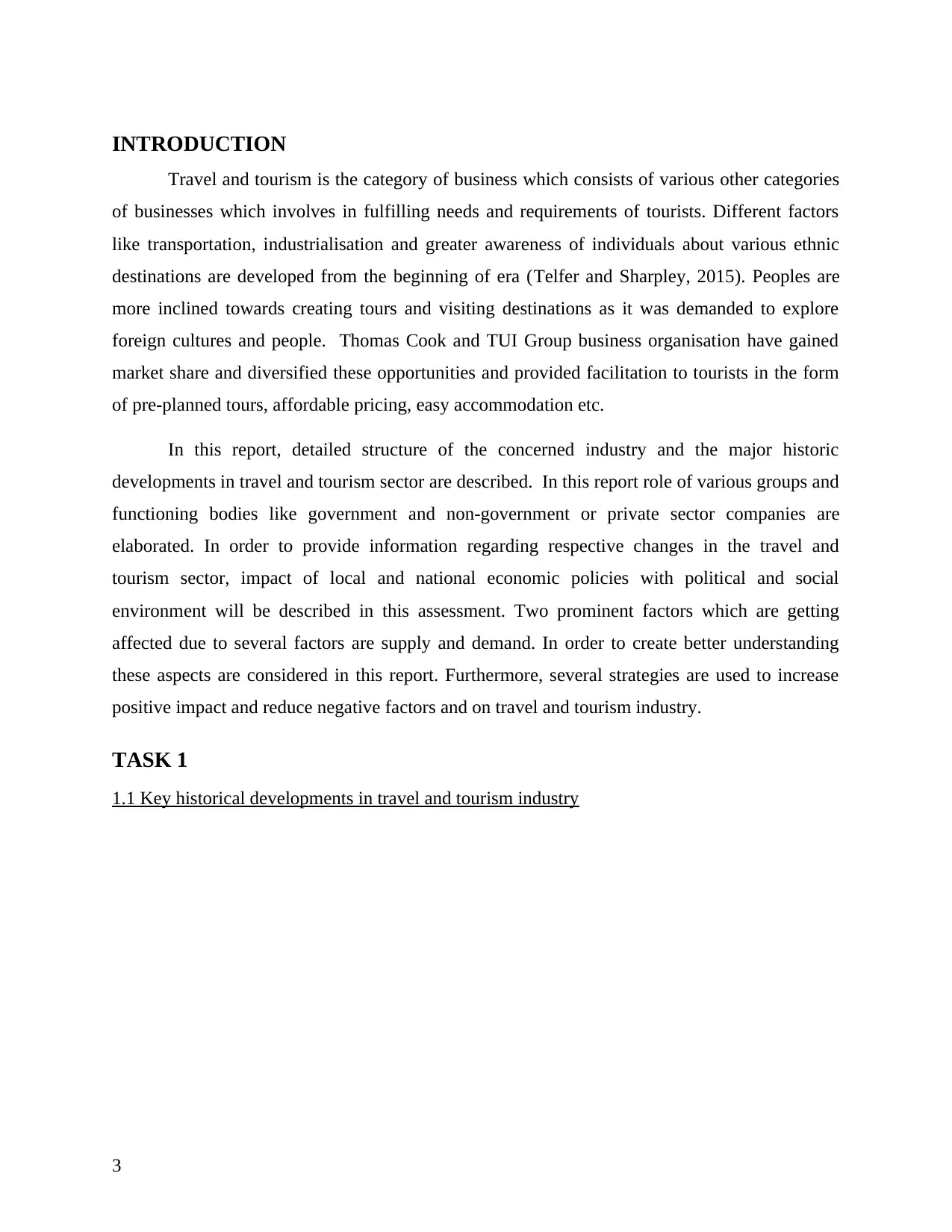
INTRODUCTION
Travel and tourism is the category of business which consists of various other categories
of businesses which involves in fulfilling needs and requirements of tourists. Different factors
like transportation, industrialisation and greater awareness of individuals about various ethnic
destinations are developed from the beginning of era (Telfer and Sharpley, 2015). Peoples are
more inclined towards creating tours and visiting destinations as it was demanded to explore
foreign cultures and people. Thomas Cook and TUI Group business organisation have gained
market share and diversified these opportunities and provided facilitation to tourists in the form
of pre-planned tours, affordable pricing, easy accommodation etc.
In this report, detailed structure of the concerned industry and the major historic
developments in travel and tourism sector are described. In this report role of various groups and
functioning bodies like government and non-government or private sector companies are
elaborated. In order to provide information regarding respective changes in the travel and
tourism sector, impact of local and national economic policies with political and social
environment will be described in this assessment. Two prominent factors which are getting
affected due to several factors are supply and demand. In order to create better understanding
these aspects are considered in this report. Furthermore, several strategies are used to increase
positive impact and reduce negative factors and on travel and tourism industry.
TASK 1
1.1 Key historical developments in travel and tourism industry
3
Travel and tourism is the category of business which consists of various other categories
of businesses which involves in fulfilling needs and requirements of tourists. Different factors
like transportation, industrialisation and greater awareness of individuals about various ethnic
destinations are developed from the beginning of era (Telfer and Sharpley, 2015). Peoples are
more inclined towards creating tours and visiting destinations as it was demanded to explore
foreign cultures and people. Thomas Cook and TUI Group business organisation have gained
market share and diversified these opportunities and provided facilitation to tourists in the form
of pre-planned tours, affordable pricing, easy accommodation etc.
In this report, detailed structure of the concerned industry and the major historic
developments in travel and tourism sector are described. In this report role of various groups and
functioning bodies like government and non-government or private sector companies are
elaborated. In order to provide information regarding respective changes in the travel and
tourism sector, impact of local and national economic policies with political and social
environment will be described in this assessment. Two prominent factors which are getting
affected due to several factors are supply and demand. In order to create better understanding
these aspects are considered in this report. Furthermore, several strategies are used to increase
positive impact and reduce negative factors and on travel and tourism industry.
TASK 1
1.1 Key historical developments in travel and tourism industry
3

1.2 Structure of travel and tourism sector
4
4
Secure Best Marks with AI Grader
Need help grading? Try our AI Grader for instant feedback on your assignments.

5

TASK 2
2.1 and 2.2 in ppt
6
2.1 and 2.2 in ppt
6
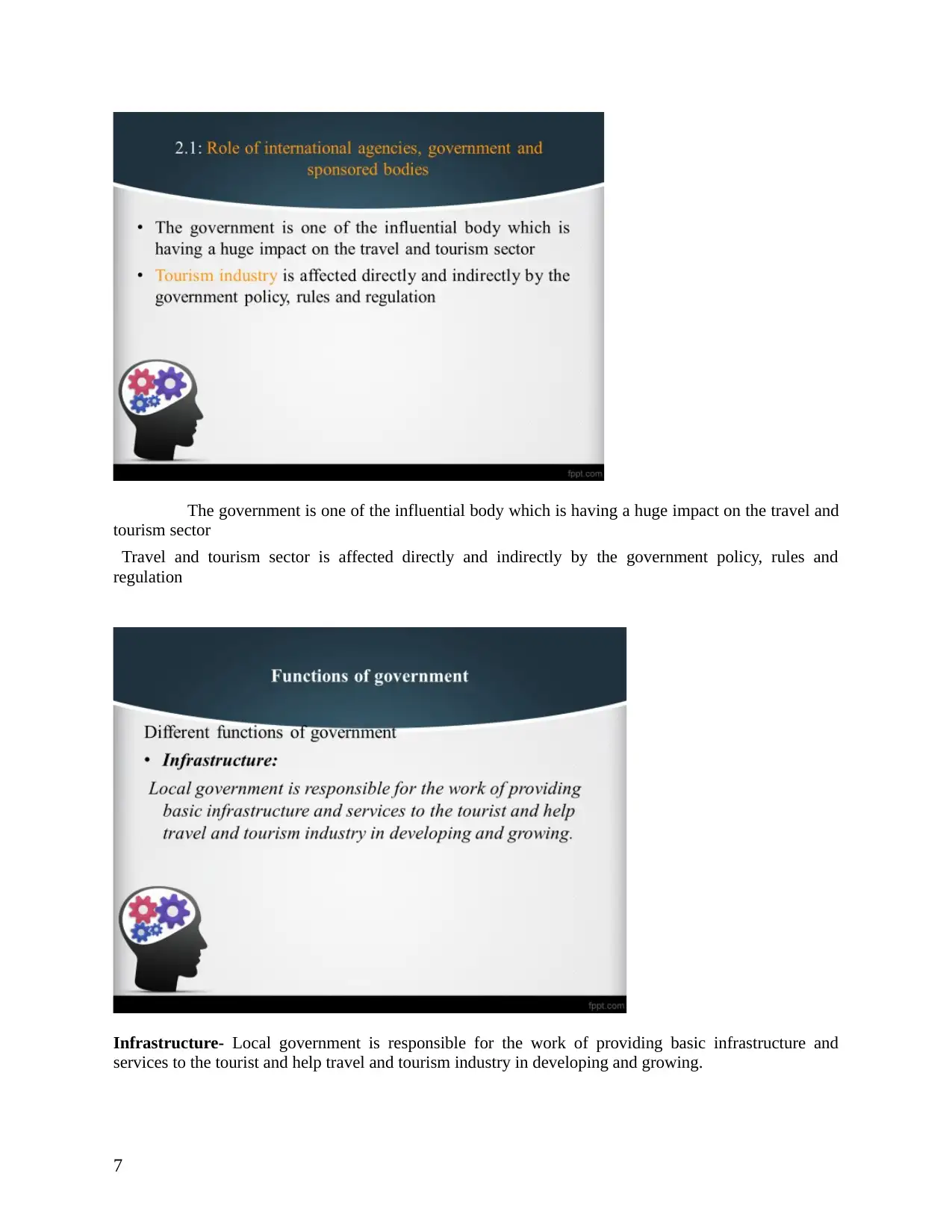
The government is one of the influential body which is having a huge impact on the travel and
tourism sector
Travel and tourism sector is affected directly and indirectly by the government policy, rules and
regulation
Infrastructure- Local government is responsible for the work of providing basic infrastructure and
services to the tourist and help travel and tourism industry in developing and growing.
7
tourism sector
Travel and tourism sector is affected directly and indirectly by the government policy, rules and
regulation
Infrastructure- Local government is responsible for the work of providing basic infrastructure and
services to the tourist and help travel and tourism industry in developing and growing.
7
Paraphrase This Document
Need a fresh take? Get an instant paraphrase of this document with our AI Paraphraser
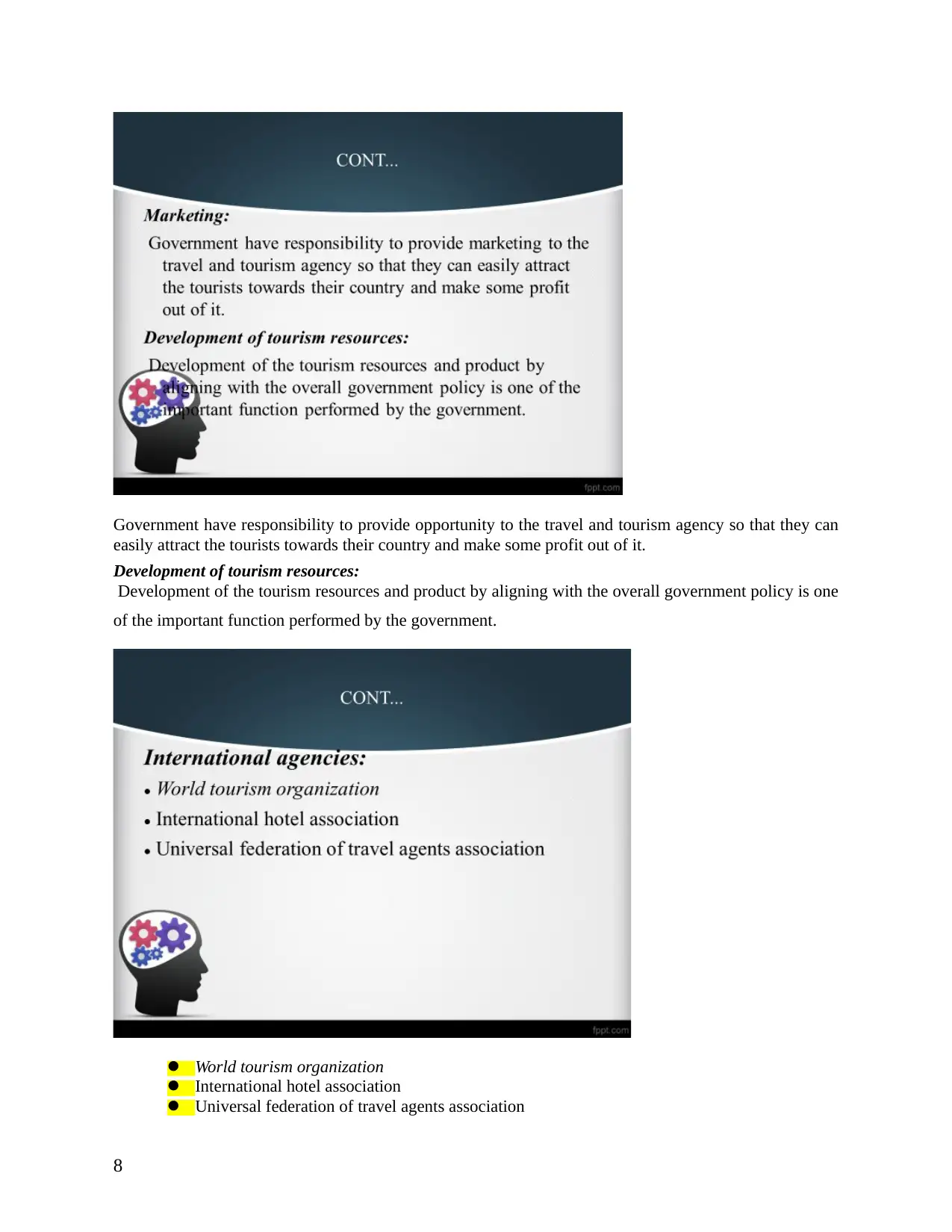
Government have responsibility to provide opportunity to the travel and tourism agency so that they can
easily attract the tourists towards their country and make some profit out of it.
Development of tourism resources:
Development of the tourism resources and product by aligning with the overall government policy is one
of the important function performed by the government.
World tourism organization
International hotel association
Universal federation of travel agents association
8
easily attract the tourists towards their country and make some profit out of it.
Development of tourism resources:
Development of the tourism resources and product by aligning with the overall government policy is one
of the important function performed by the government.
World tourism organization
International hotel association
Universal federation of travel agents association
8

9
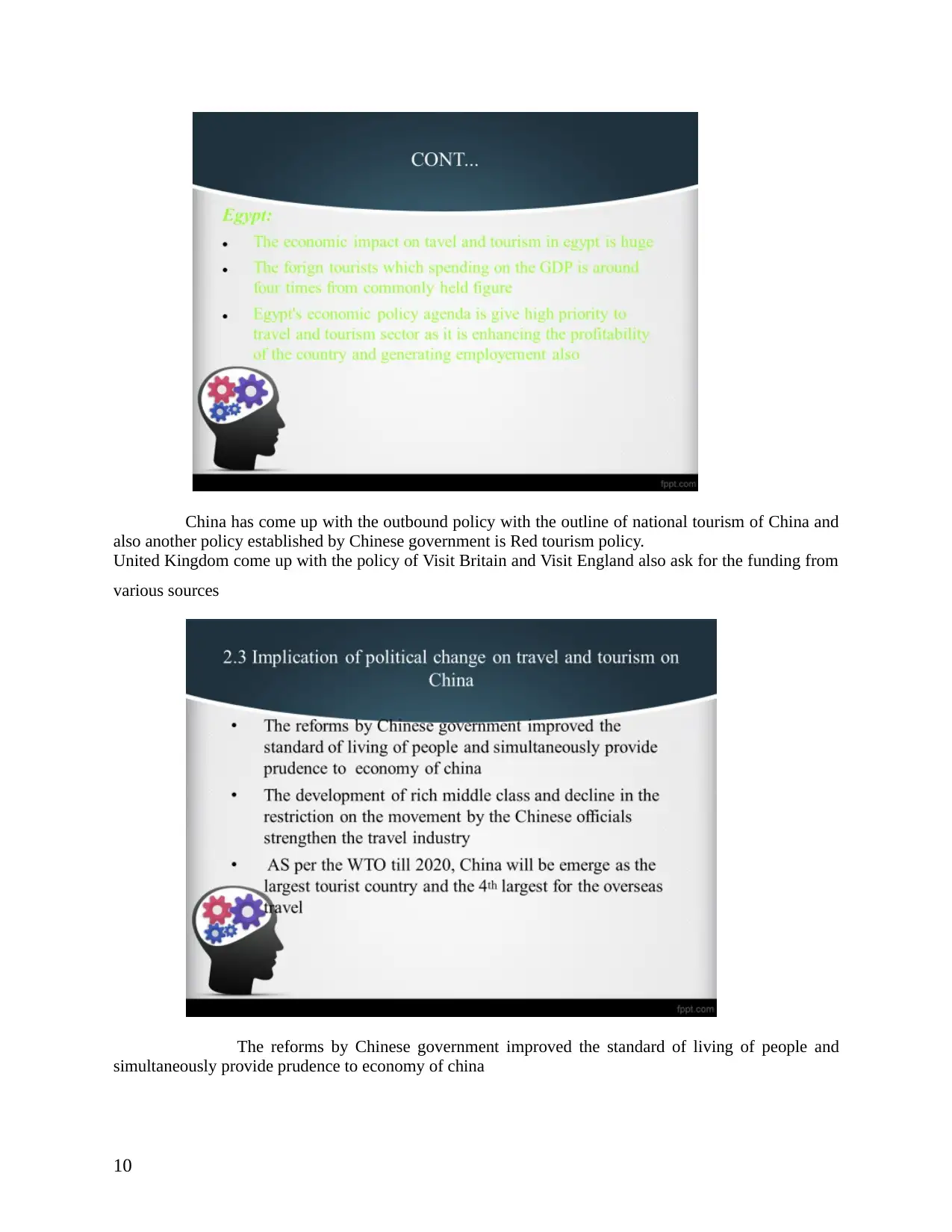
China has come up with the outbound policy with the outline of national tourism of China and
also another policy established by Chinese government is Red tourism policy.
United Kingdom come up with the policy of Visit Britain and Visit England also ask for the funding from
various sources
The reforms by Chinese government improved the standard of living of people and
simultaneously provide prudence to economy of china
10
also another policy established by Chinese government is Red tourism policy.
United Kingdom come up with the policy of Visit Britain and Visit England also ask for the funding from
various sources
The reforms by Chinese government improved the standard of living of people and
simultaneously provide prudence to economy of china
10
Secure Best Marks with AI Grader
Need help grading? Try our AI Grader for instant feedback on your assignments.
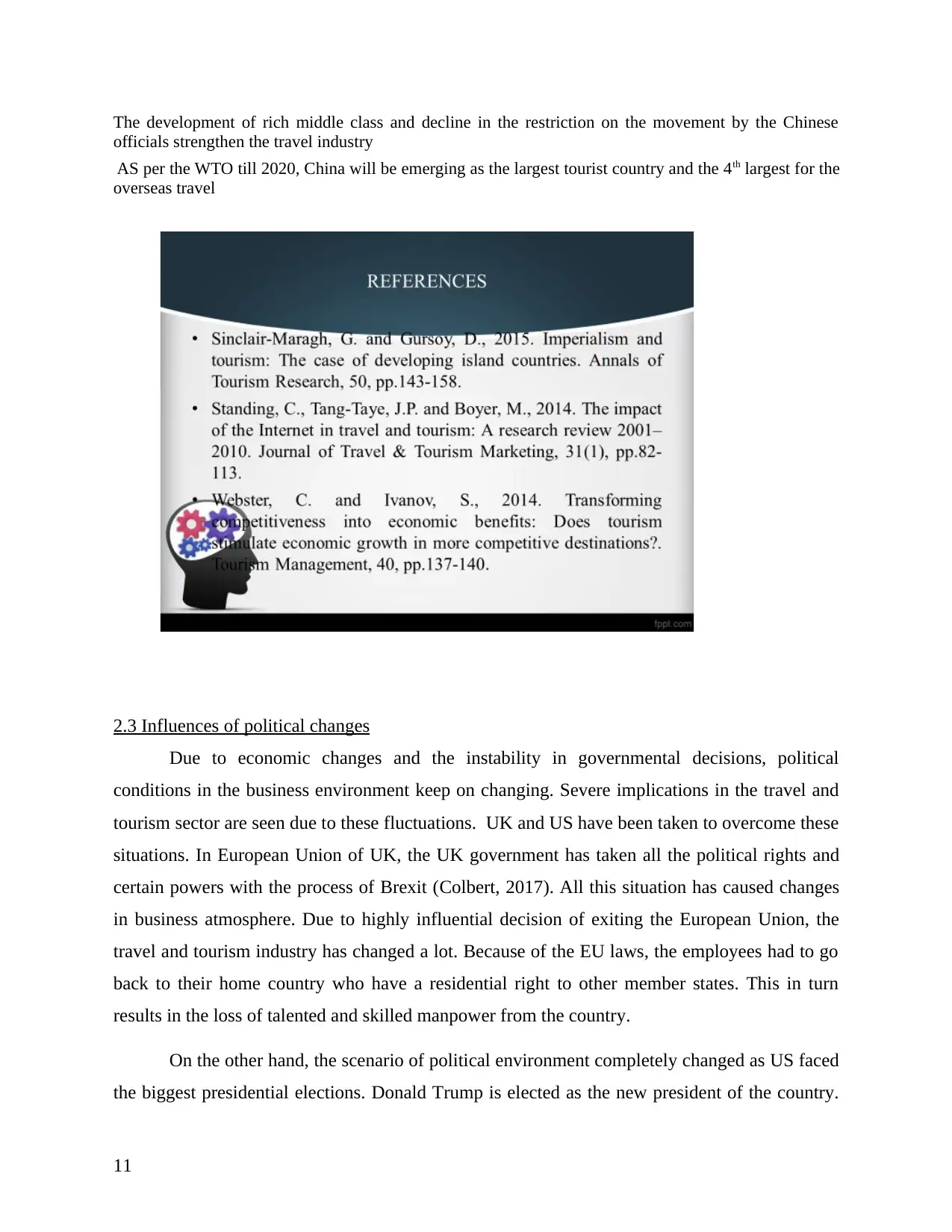
The development of rich middle class and decline in the restriction on the movement by the Chinese
officials strengthen the travel industry
AS per the WTO till 2020, China will be emerging as the largest tourist country and the 4th largest for the
overseas travel
2.3 Influences of political changes
Due to economic changes and the instability in governmental decisions, political
conditions in the business environment keep on changing. Severe implications in the travel and
tourism sector are seen due to these fluctuations. UK and US have been taken to overcome these
situations. In European Union of UK, the UK government has taken all the political rights and
certain powers with the process of Brexit (Colbert, 2017). All this situation has caused changes
in business atmosphere. Due to highly influential decision of exiting the European Union, the
travel and tourism industry has changed a lot. Because of the EU laws, the employees had to go
back to their home country who have a residential right to other member states. This in turn
results in the loss of talented and skilled manpower from the country.
On the other hand, the scenario of political environment completely changed as US faced
the biggest presidential elections. Donald Trump is elected as the new president of the country.
11
officials strengthen the travel industry
AS per the WTO till 2020, China will be emerging as the largest tourist country and the 4th largest for the
overseas travel
2.3 Influences of political changes
Due to economic changes and the instability in governmental decisions, political
conditions in the business environment keep on changing. Severe implications in the travel and
tourism sector are seen due to these fluctuations. UK and US have been taken to overcome these
situations. In European Union of UK, the UK government has taken all the political rights and
certain powers with the process of Brexit (Colbert, 2017). All this situation has caused changes
in business atmosphere. Due to highly influential decision of exiting the European Union, the
travel and tourism industry has changed a lot. Because of the EU laws, the employees had to go
back to their home country who have a residential right to other member states. This in turn
results in the loss of talented and skilled manpower from the country.
On the other hand, the scenario of political environment completely changed as US faced
the biggest presidential elections. Donald Trump is elected as the new president of the country.
11
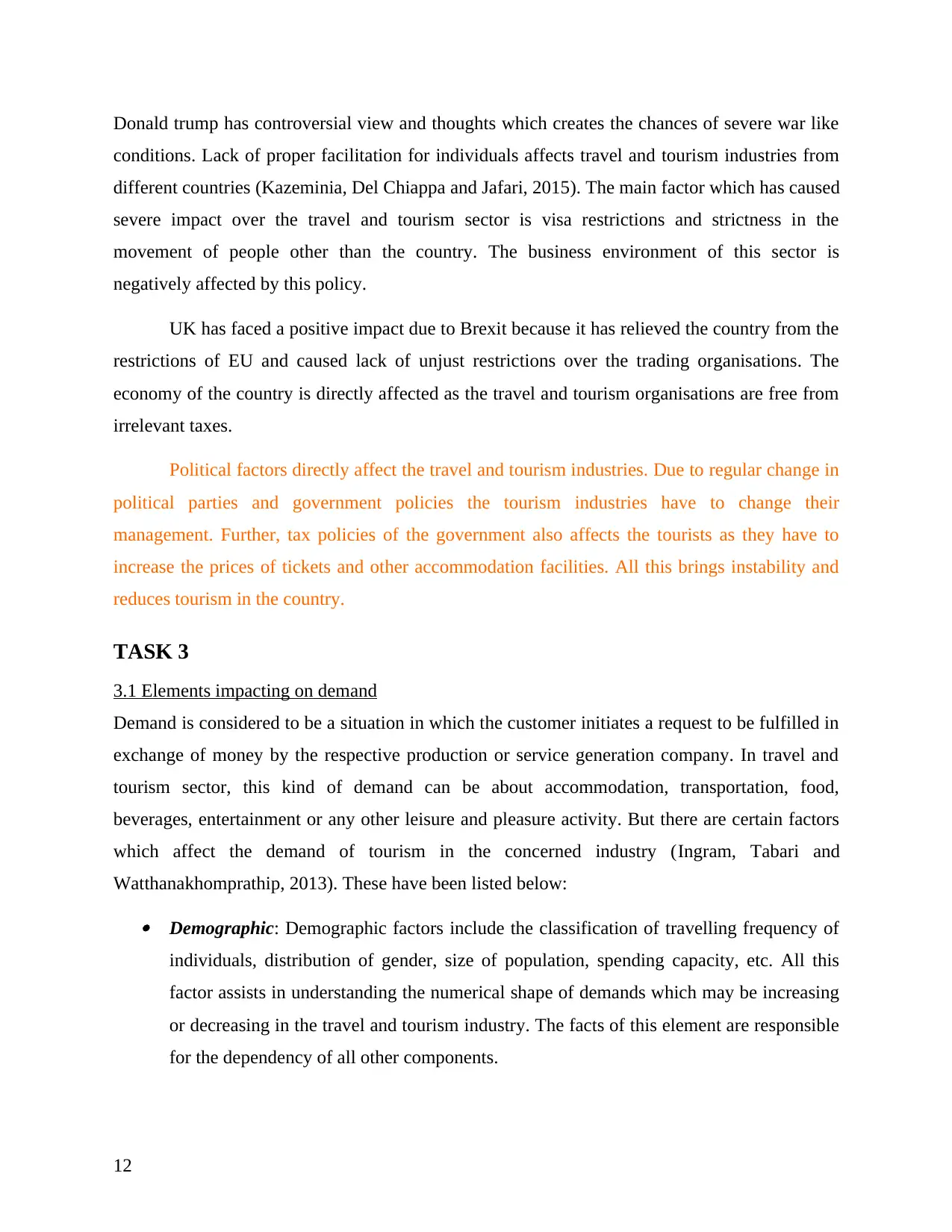
Donald trump has controversial view and thoughts which creates the chances of severe war like
conditions. Lack of proper facilitation for individuals affects travel and tourism industries from
different countries (Kazeminia, Del Chiappa and Jafari, 2015). The main factor which has caused
severe impact over the travel and tourism sector is visa restrictions and strictness in the
movement of people other than the country. The business environment of this sector is
negatively affected by this policy.
UK has faced a positive impact due to Brexit because it has relieved the country from the
restrictions of EU and caused lack of unjust restrictions over the trading organisations. The
economy of the country is directly affected as the travel and tourism organisations are free from
irrelevant taxes.
Political factors directly affect the travel and tourism industries. Due to regular change in
political parties and government policies the tourism industries have to change their
management. Further, tax policies of the government also affects the tourists as they have to
increase the prices of tickets and other accommodation facilities. All this brings instability and
reduces tourism in the country.
TASK 3
3.1 Elements impacting on demand
Demand is considered to be a situation in which the customer initiates a request to be fulfilled in
exchange of money by the respective production or service generation company. In travel and
tourism sector, this kind of demand can be about accommodation, transportation, food,
beverages, entertainment or any other leisure and pleasure activity. But there are certain factors
which affect the demand of tourism in the concerned industry (Ingram, Tabari and
Watthanakhomprathip, 2013). These have been listed below: Demographic: Demographic factors include the classification of travelling frequency of
individuals, distribution of gender, size of population, spending capacity, etc. All this
factor assists in understanding the numerical shape of demands which may be increasing
or decreasing in the travel and tourism industry. The facts of this element are responsible
for the dependency of all other components.
12
conditions. Lack of proper facilitation for individuals affects travel and tourism industries from
different countries (Kazeminia, Del Chiappa and Jafari, 2015). The main factor which has caused
severe impact over the travel and tourism sector is visa restrictions and strictness in the
movement of people other than the country. The business environment of this sector is
negatively affected by this policy.
UK has faced a positive impact due to Brexit because it has relieved the country from the
restrictions of EU and caused lack of unjust restrictions over the trading organisations. The
economy of the country is directly affected as the travel and tourism organisations are free from
irrelevant taxes.
Political factors directly affect the travel and tourism industries. Due to regular change in
political parties and government policies the tourism industries have to change their
management. Further, tax policies of the government also affects the tourists as they have to
increase the prices of tickets and other accommodation facilities. All this brings instability and
reduces tourism in the country.
TASK 3
3.1 Elements impacting on demand
Demand is considered to be a situation in which the customer initiates a request to be fulfilled in
exchange of money by the respective production or service generation company. In travel and
tourism sector, this kind of demand can be about accommodation, transportation, food,
beverages, entertainment or any other leisure and pleasure activity. But there are certain factors
which affect the demand of tourism in the concerned industry (Ingram, Tabari and
Watthanakhomprathip, 2013). These have been listed below: Demographic: Demographic factors include the classification of travelling frequency of
individuals, distribution of gender, size of population, spending capacity, etc. All this
factor assists in understanding the numerical shape of demands which may be increasing
or decreasing in the travel and tourism industry. The facts of this element are responsible
for the dependency of all other components.
12

Technological: Organisations working in this sector has influenced to transform their
functions according to the latest technological development. Due to the convenience and
comfort provided to employees by technological developments, the dependency of
individuals over technological aspects are increased. Significant decline is caused in the
demand if there is no proper integration (Scott, Hall and Gössling., 2016). For example,
then visitors do not visit the hotel again if a hotel doesn’t have wifi connection. Economical: The economic impact may create the problem of financial crises to the
company. The number of visitors will significantly decline if interest rates are increased
and there are more restrictions over trade. As a matter of fact, it leads to decrease in the
inbound trade or domestic tourism (Becker, 2016). Therefore, the balance approach must
be followed while devising economic policies and reforms. Political: When political environment of a country is more stable, The demands of
tourists are more likely to be fulfilled. In UK, there is high amount of political stability
and maturity in controlling public as compared to any other country. This thing helps the
country lot as they can attract their customers to spend more time and leisure to their
country. Legal: The legislations or legal framework which has been designed by the government
or judicial bodies to safeguard them from different kinds of crimes and unethical
practises often turns the other way round. The demands can be reduced when government
pass several legislations or laws for banning particular person or community for
abolishing the use of certain items (Buzard and et.al., 2015).
Globalisation: The locomotion of individuals from one place to another especially on the
international scale has caused significant changes in demand. The number of people
travelling for their pleasure and satisfaction has increased as compared to the ones who
travel in search for essentials of living.
Time-management- If the services that are being provided to the customers are time-
inefficient then it will decrease the satisfaction of customers and thus, the product
demand will be decrease.
13
functions according to the latest technological development. Due to the convenience and
comfort provided to employees by technological developments, the dependency of
individuals over technological aspects are increased. Significant decline is caused in the
demand if there is no proper integration (Scott, Hall and Gössling., 2016). For example,
then visitors do not visit the hotel again if a hotel doesn’t have wifi connection. Economical: The economic impact may create the problem of financial crises to the
company. The number of visitors will significantly decline if interest rates are increased
and there are more restrictions over trade. As a matter of fact, it leads to decrease in the
inbound trade or domestic tourism (Becker, 2016). Therefore, the balance approach must
be followed while devising economic policies and reforms. Political: When political environment of a country is more stable, The demands of
tourists are more likely to be fulfilled. In UK, there is high amount of political stability
and maturity in controlling public as compared to any other country. This thing helps the
country lot as they can attract their customers to spend more time and leisure to their
country. Legal: The legislations or legal framework which has been designed by the government
or judicial bodies to safeguard them from different kinds of crimes and unethical
practises often turns the other way round. The demands can be reduced when government
pass several legislations or laws for banning particular person or community for
abolishing the use of certain items (Buzard and et.al., 2015).
Globalisation: The locomotion of individuals from one place to another especially on the
international scale has caused significant changes in demand. The number of people
travelling for their pleasure and satisfaction has increased as compared to the ones who
travel in search for essentials of living.
Time-management- If the services that are being provided to the customers are time-
inefficient then it will decrease the satisfaction of customers and thus, the product
demand will be decrease.
13
Paraphrase This Document
Need a fresh take? Get an instant paraphrase of this document with our AI Paraphraser
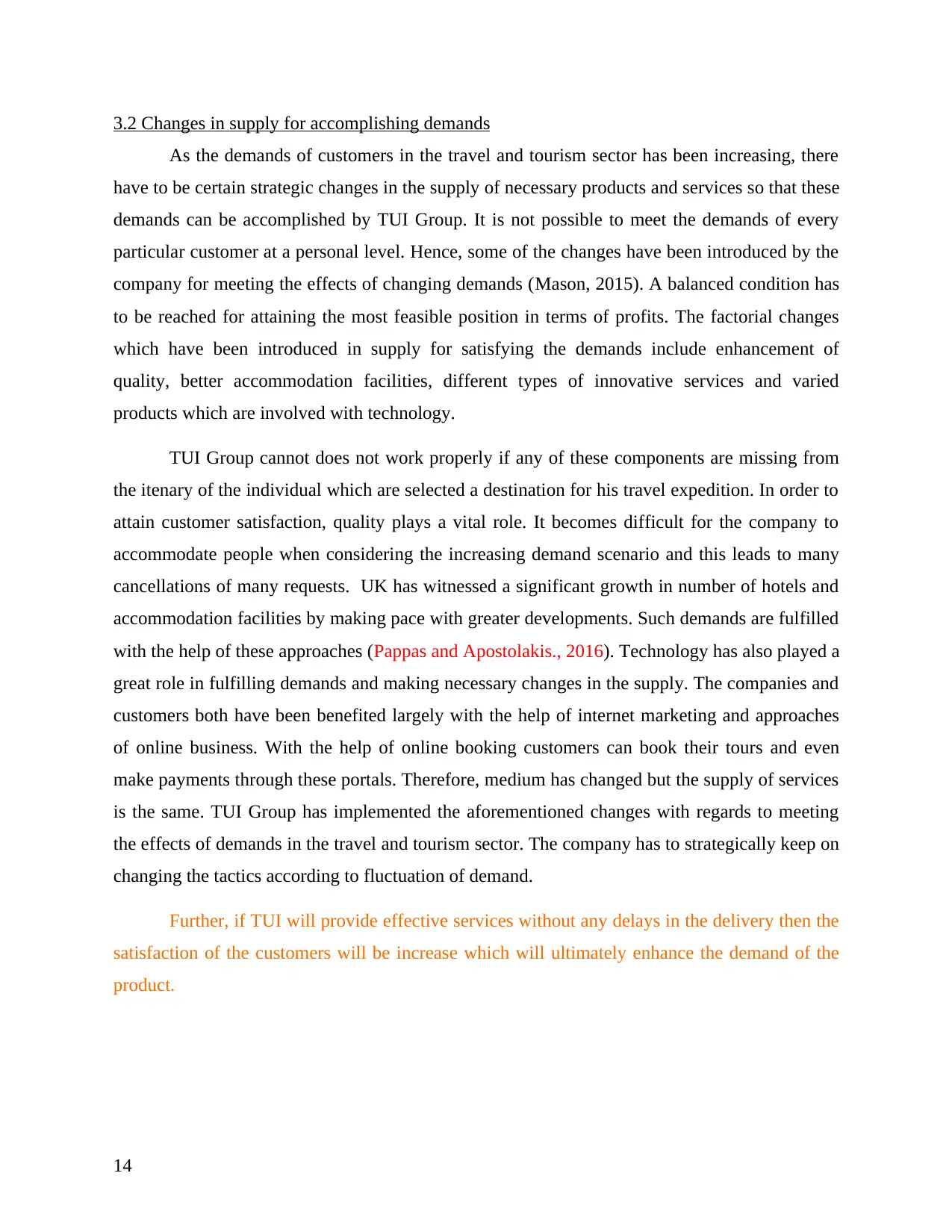
3.2 Changes in supply for accomplishing demands
As the demands of customers in the travel and tourism sector has been increasing, there
have to be certain strategic changes in the supply of necessary products and services so that these
demands can be accomplished by TUI Group. It is not possible to meet the demands of every
particular customer at a personal level. Hence, some of the changes have been introduced by the
company for meeting the effects of changing demands (Mason, 2015). A balanced condition has
to be reached for attaining the most feasible position in terms of profits. The factorial changes
which have been introduced in supply for satisfying the demands include enhancement of
quality, better accommodation facilities, different types of innovative services and varied
products which are involved with technology.
TUI Group cannot does not work properly if any of these components are missing from
the itenary of the individual which are selected a destination for his travel expedition. In order to
attain customer satisfaction, quality plays a vital role. It becomes difficult for the company to
accommodate people when considering the increasing demand scenario and this leads to many
cancellations of many requests. UK has witnessed a significant growth in number of hotels and
accommodation facilities by making pace with greater developments. Such demands are fulfilled
with the help of these approaches (Pappas and Apostolakis., 2016). Technology has also played a
great role in fulfilling demands and making necessary changes in the supply. The companies and
customers both have been benefited largely with the help of internet marketing and approaches
of online business. With the help of online booking customers can book their tours and even
make payments through these portals. Therefore, medium has changed but the supply of services
is the same. TUI Group has implemented the aforementioned changes with regards to meeting
the effects of demands in the travel and tourism sector. The company has to strategically keep on
changing the tactics according to fluctuation of demand.
Further, if TUI will provide effective services without any delays in the delivery then the
satisfaction of the customers will be increase which will ultimately enhance the demand of the
product.
14
As the demands of customers in the travel and tourism sector has been increasing, there
have to be certain strategic changes in the supply of necessary products and services so that these
demands can be accomplished by TUI Group. It is not possible to meet the demands of every
particular customer at a personal level. Hence, some of the changes have been introduced by the
company for meeting the effects of changing demands (Mason, 2015). A balanced condition has
to be reached for attaining the most feasible position in terms of profits. The factorial changes
which have been introduced in supply for satisfying the demands include enhancement of
quality, better accommodation facilities, different types of innovative services and varied
products which are involved with technology.
TUI Group cannot does not work properly if any of these components are missing from
the itenary of the individual which are selected a destination for his travel expedition. In order to
attain customer satisfaction, quality plays a vital role. It becomes difficult for the company to
accommodate people when considering the increasing demand scenario and this leads to many
cancellations of many requests. UK has witnessed a significant growth in number of hotels and
accommodation facilities by making pace with greater developments. Such demands are fulfilled
with the help of these approaches (Pappas and Apostolakis., 2016). Technology has also played a
great role in fulfilling demands and making necessary changes in the supply. The companies and
customers both have been benefited largely with the help of internet marketing and approaches
of online business. With the help of online booking customers can book their tours and even
make payments through these portals. Therefore, medium has changed but the supply of services
is the same. TUI Group has implemented the aforementioned changes with regards to meeting
the effects of demands in the travel and tourism sector. The company has to strategically keep on
changing the tactics according to fluctuation of demand.
Further, if TUI will provide effective services without any delays in the delivery then the
satisfaction of the customers will be increase which will ultimately enhance the demand of the
product.
14
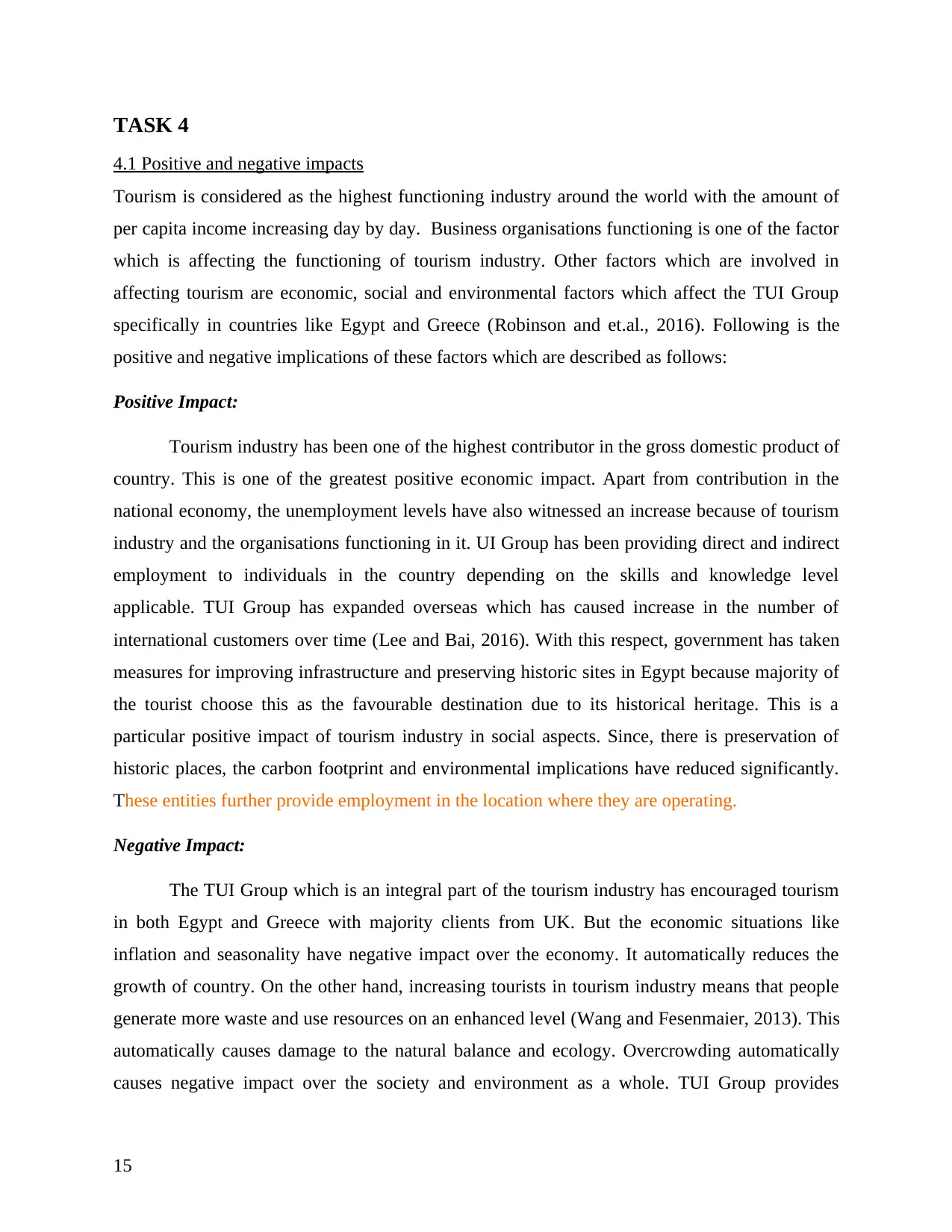
TASK 4
4.1 Positive and negative impacts
Tourism is considered as the highest functioning industry around the world with the amount of
per capita income increasing day by day. Business organisations functioning is one of the factor
which is affecting the functioning of tourism industry. Other factors which are involved in
affecting tourism are economic, social and environmental factors which affect the TUI Group
specifically in countries like Egypt and Greece (Robinson and et.al., 2016). Following is the
positive and negative implications of these factors which are described as follows:
Positive Impact:
Tourism industry has been one of the highest contributor in the gross domestic product of
country. This is one of the greatest positive economic impact. Apart from contribution in the
national economy, the unemployment levels have also witnessed an increase because of tourism
industry and the organisations functioning in it. UI Group has been providing direct and indirect
employment to individuals in the country depending on the skills and knowledge level
applicable. TUI Group has expanded overseas which has caused increase in the number of
international customers over time (Lee and Bai, 2016). With this respect, government has taken
measures for improving infrastructure and preserving historic sites in Egypt because majority of
the tourist choose this as the favourable destination due to its historical heritage. This is a
particular positive impact of tourism industry in social aspects. Since, there is preservation of
historic places, the carbon footprint and environmental implications have reduced significantly.
These entities further provide employment in the location where they are operating.
Negative Impact:
The TUI Group which is an integral part of the tourism industry has encouraged tourism
in both Egypt and Greece with majority clients from UK. But the economic situations like
inflation and seasonality have negative impact over the economy. It automatically reduces the
growth of country. On the other hand, increasing tourists in tourism industry means that people
generate more waste and use resources on an enhanced level (Wang and Fesenmaier, 2013). This
automatically causes damage to the natural balance and ecology. Overcrowding automatically
causes negative impact over the society and environment as a whole. TUI Group provides
15
4.1 Positive and negative impacts
Tourism is considered as the highest functioning industry around the world with the amount of
per capita income increasing day by day. Business organisations functioning is one of the factor
which is affecting the functioning of tourism industry. Other factors which are involved in
affecting tourism are economic, social and environmental factors which affect the TUI Group
specifically in countries like Egypt and Greece (Robinson and et.al., 2016). Following is the
positive and negative implications of these factors which are described as follows:
Positive Impact:
Tourism industry has been one of the highest contributor in the gross domestic product of
country. This is one of the greatest positive economic impact. Apart from contribution in the
national economy, the unemployment levels have also witnessed an increase because of tourism
industry and the organisations functioning in it. UI Group has been providing direct and indirect
employment to individuals in the country depending on the skills and knowledge level
applicable. TUI Group has expanded overseas which has caused increase in the number of
international customers over time (Lee and Bai, 2016). With this respect, government has taken
measures for improving infrastructure and preserving historic sites in Egypt because majority of
the tourist choose this as the favourable destination due to its historical heritage. This is a
particular positive impact of tourism industry in social aspects. Since, there is preservation of
historic places, the carbon footprint and environmental implications have reduced significantly.
These entities further provide employment in the location where they are operating.
Negative Impact:
The TUI Group which is an integral part of the tourism industry has encouraged tourism
in both Egypt and Greece with majority clients from UK. But the economic situations like
inflation and seasonality have negative impact over the economy. It automatically reduces the
growth of country. On the other hand, increasing tourists in tourism industry means that people
generate more waste and use resources on an enhanced level (Wang and Fesenmaier, 2013). This
automatically causes damage to the natural balance and ecology. Overcrowding automatically
causes negative impact over the society and environment as a whole. TUI Group provides
15
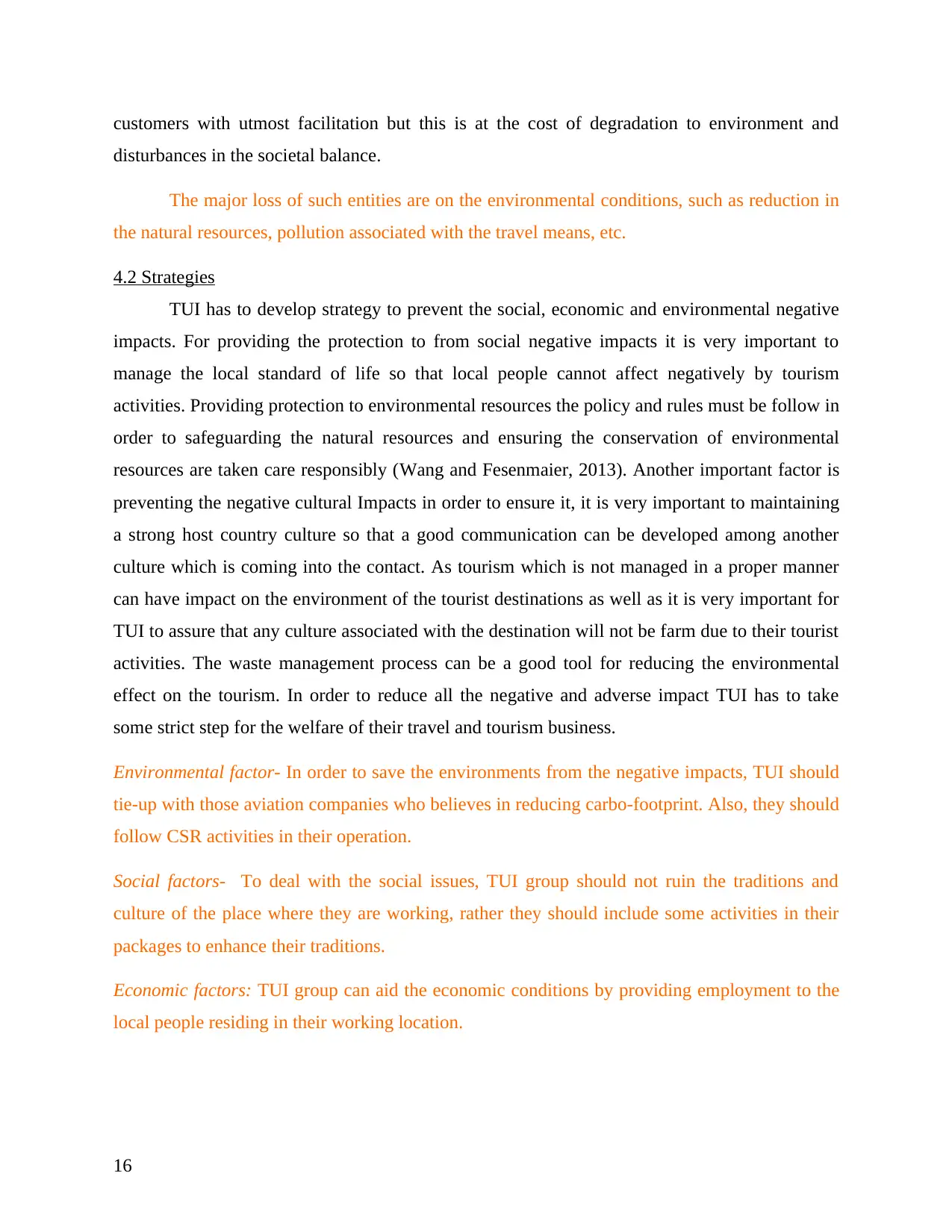
customers with utmost facilitation but this is at the cost of degradation to environment and
disturbances in the societal balance.
The major loss of such entities are on the environmental conditions, such as reduction in
the natural resources, pollution associated with the travel means, etc.
4.2 Strategies
TUI has to develop strategy to prevent the social, economic and environmental negative
impacts. For providing the protection to from social negative impacts it is very important to
manage the local standard of life so that local people cannot affect negatively by tourism
activities. Providing protection to environmental resources the policy and rules must be follow in
order to safeguarding the natural resources and ensuring the conservation of environmental
resources are taken care responsibly (Wang and Fesenmaier, 2013). Another important factor is
preventing the negative cultural Impacts in order to ensure it, it is very important to maintaining
a strong host country culture so that a good communication can be developed among another
culture which is coming into the contact. As tourism which is not managed in a proper manner
can have impact on the environment of the tourist destinations as well as it is very important for
TUI to assure that any culture associated with the destination will not be farm due to their tourist
activities. The waste management process can be a good tool for reducing the environmental
effect on the tourism. In order to reduce all the negative and adverse impact TUI has to take
some strict step for the welfare of their travel and tourism business.
Environmental factor- In order to save the environments from the negative impacts, TUI should
tie-up with those aviation companies who believes in reducing carbo-footprint. Also, they should
follow CSR activities in their operation.
Social factors- To deal with the social issues, TUI group should not ruin the traditions and
culture of the place where they are working, rather they should include some activities in their
packages to enhance their traditions.
Economic factors: TUI group can aid the economic conditions by providing employment to the
local people residing in their working location.
16
disturbances in the societal balance.
The major loss of such entities are on the environmental conditions, such as reduction in
the natural resources, pollution associated with the travel means, etc.
4.2 Strategies
TUI has to develop strategy to prevent the social, economic and environmental negative
impacts. For providing the protection to from social negative impacts it is very important to
manage the local standard of life so that local people cannot affect negatively by tourism
activities. Providing protection to environmental resources the policy and rules must be follow in
order to safeguarding the natural resources and ensuring the conservation of environmental
resources are taken care responsibly (Wang and Fesenmaier, 2013). Another important factor is
preventing the negative cultural Impacts in order to ensure it, it is very important to maintaining
a strong host country culture so that a good communication can be developed among another
culture which is coming into the contact. As tourism which is not managed in a proper manner
can have impact on the environment of the tourist destinations as well as it is very important for
TUI to assure that any culture associated with the destination will not be farm due to their tourist
activities. The waste management process can be a good tool for reducing the environmental
effect on the tourism. In order to reduce all the negative and adverse impact TUI has to take
some strict step for the welfare of their travel and tourism business.
Environmental factor- In order to save the environments from the negative impacts, TUI should
tie-up with those aviation companies who believes in reducing carbo-footprint. Also, they should
follow CSR activities in their operation.
Social factors- To deal with the social issues, TUI group should not ruin the traditions and
culture of the place where they are working, rather they should include some activities in their
packages to enhance their traditions.
Economic factors: TUI group can aid the economic conditions by providing employment to the
local people residing in their working location.
16
Secure Best Marks with AI Grader
Need help grading? Try our AI Grader for instant feedback on your assignments.
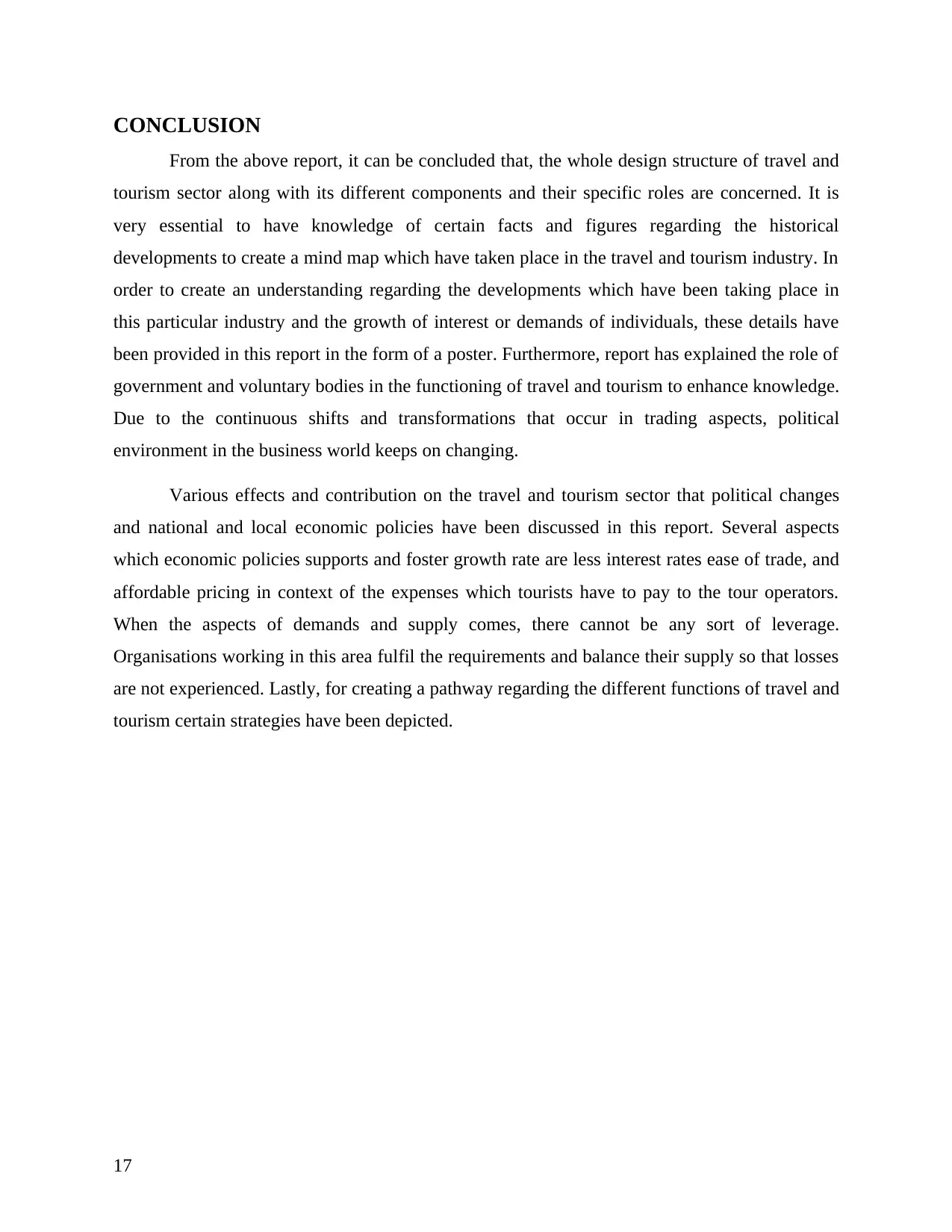
CONCLUSION
From the above report, it can be concluded that, the whole design structure of travel and
tourism sector along with its different components and their specific roles are concerned. It is
very essential to have knowledge of certain facts and figures regarding the historical
developments to create a mind map which have taken place in the travel and tourism industry. In
order to create an understanding regarding the developments which have been taking place in
this particular industry and the growth of interest or demands of individuals, these details have
been provided in this report in the form of a poster. Furthermore, report has explained the role of
government and voluntary bodies in the functioning of travel and tourism to enhance knowledge.
Due to the continuous shifts and transformations that occur in trading aspects, political
environment in the business world keeps on changing.
Various effects and contribution on the travel and tourism sector that political changes
and national and local economic policies have been discussed in this report. Several aspects
which economic policies supports and foster growth rate are less interest rates ease of trade, and
affordable pricing in context of the expenses which tourists have to pay to the tour operators.
When the aspects of demands and supply comes, there cannot be any sort of leverage.
Organisations working in this area fulfil the requirements and balance their supply so that losses
are not experienced. Lastly, for creating a pathway regarding the different functions of travel and
tourism certain strategies have been depicted.
17
From the above report, it can be concluded that, the whole design structure of travel and
tourism sector along with its different components and their specific roles are concerned. It is
very essential to have knowledge of certain facts and figures regarding the historical
developments to create a mind map which have taken place in the travel and tourism industry. In
order to create an understanding regarding the developments which have been taking place in
this particular industry and the growth of interest or demands of individuals, these details have
been provided in this report in the form of a poster. Furthermore, report has explained the role of
government and voluntary bodies in the functioning of travel and tourism to enhance knowledge.
Due to the continuous shifts and transformations that occur in trading aspects, political
environment in the business world keeps on changing.
Various effects and contribution on the travel and tourism sector that political changes
and national and local economic policies have been discussed in this report. Several aspects
which economic policies supports and foster growth rate are less interest rates ease of trade, and
affordable pricing in context of the expenses which tourists have to pay to the tour operators.
When the aspects of demands and supply comes, there cannot be any sort of leverage.
Organisations working in this area fulfil the requirements and balance their supply so that losses
are not experienced. Lastly, for creating a pathway regarding the different functions of travel and
tourism certain strategies have been depicted.
17
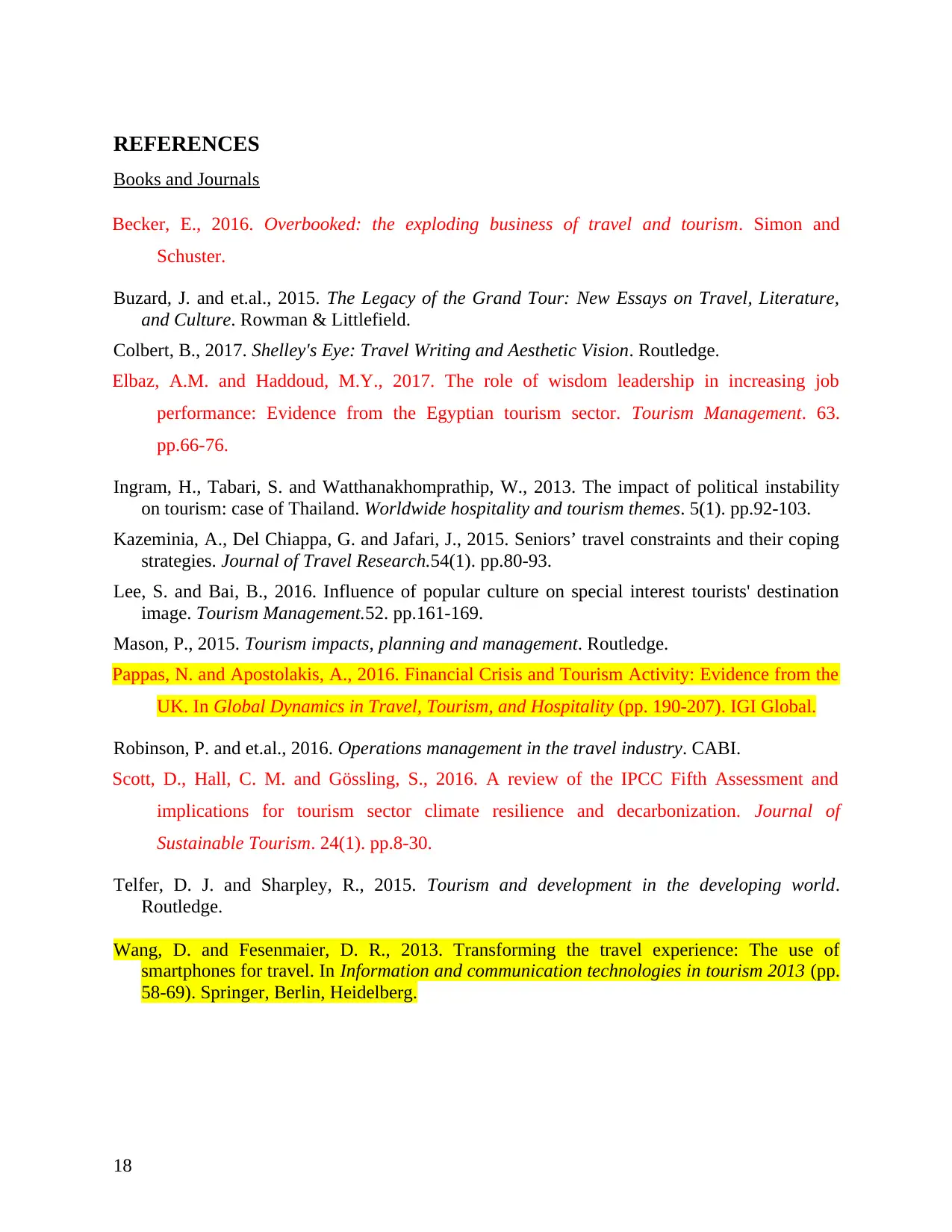
REFERENCES
Books and Journals
Becker, E., 2016. Overbooked: the exploding business of travel and tourism. Simon and
Schuster.
Buzard, J. and et.al., 2015. The Legacy of the Grand Tour: New Essays on Travel, Literature,
and Culture. Rowman & Littlefield.
Colbert, B., 2017. Shelley's Eye: Travel Writing and Aesthetic Vision. Routledge.
Elbaz, A.M. and Haddoud, M.Y., 2017. The role of wisdom leadership in increasing job
performance: Evidence from the Egyptian tourism sector. Tourism Management. 63.
pp.66-76.
Ingram, H., Tabari, S. and Watthanakhomprathip, W., 2013. The impact of political instability
on tourism: case of Thailand. Worldwide hospitality and tourism themes. 5(1). pp.92-103.
Kazeminia, A., Del Chiappa, G. and Jafari, J., 2015. Seniors’ travel constraints and their coping
strategies. Journal of Travel Research.54(1). pp.80-93.
Lee, S. and Bai, B., 2016. Influence of popular culture on special interest tourists' destination
image. Tourism Management.52. pp.161-169.
Mason, P., 2015. Tourism impacts, planning and management. Routledge.
Pappas, N. and Apostolakis, A., 2016. Financial Crisis and Tourism Activity: Evidence from the
UK. In Global Dynamics in Travel, Tourism, and Hospitality (pp. 190-207). IGI Global.
Robinson, P. and et.al., 2016. Operations management in the travel industry. CABI.
Scott, D., Hall, C. M. and Gössling, S., 2016. A review of the IPCC Fifth Assessment and
implications for tourism sector climate resilience and decarbonization. Journal of
Sustainable Tourism. 24(1). pp.8-30.
Telfer, D. J. and Sharpley, R., 2015. Tourism and development in the developing world.
Routledge.
Wang, D. and Fesenmaier, D. R., 2013. Transforming the travel experience: The use of
smartphones for travel. In Information and communication technologies in tourism 2013 (pp.
58-69). Springer, Berlin, Heidelberg.
18
Books and Journals
Becker, E., 2016. Overbooked: the exploding business of travel and tourism. Simon and
Schuster.
Buzard, J. and et.al., 2015. The Legacy of the Grand Tour: New Essays on Travel, Literature,
and Culture. Rowman & Littlefield.
Colbert, B., 2017. Shelley's Eye: Travel Writing and Aesthetic Vision. Routledge.
Elbaz, A.M. and Haddoud, M.Y., 2017. The role of wisdom leadership in increasing job
performance: Evidence from the Egyptian tourism sector. Tourism Management. 63.
pp.66-76.
Ingram, H., Tabari, S. and Watthanakhomprathip, W., 2013. The impact of political instability
on tourism: case of Thailand. Worldwide hospitality and tourism themes. 5(1). pp.92-103.
Kazeminia, A., Del Chiappa, G. and Jafari, J., 2015. Seniors’ travel constraints and their coping
strategies. Journal of Travel Research.54(1). pp.80-93.
Lee, S. and Bai, B., 2016. Influence of popular culture on special interest tourists' destination
image. Tourism Management.52. pp.161-169.
Mason, P., 2015. Tourism impacts, planning and management. Routledge.
Pappas, N. and Apostolakis, A., 2016. Financial Crisis and Tourism Activity: Evidence from the
UK. In Global Dynamics in Travel, Tourism, and Hospitality (pp. 190-207). IGI Global.
Robinson, P. and et.al., 2016. Operations management in the travel industry. CABI.
Scott, D., Hall, C. M. and Gössling, S., 2016. A review of the IPCC Fifth Assessment and
implications for tourism sector climate resilience and decarbonization. Journal of
Sustainable Tourism. 24(1). pp.8-30.
Telfer, D. J. and Sharpley, R., 2015. Tourism and development in the developing world.
Routledge.
Wang, D. and Fesenmaier, D. R., 2013. Transforming the travel experience: The use of
smartphones for travel. In Information and communication technologies in tourism 2013 (pp.
58-69). Springer, Berlin, Heidelberg.
18
1 out of 18
Related Documents
Your All-in-One AI-Powered Toolkit for Academic Success.
+13062052269
info@desklib.com
Available 24*7 on WhatsApp / Email
![[object Object]](/_next/static/media/star-bottom.7253800d.svg)
Unlock your academic potential
© 2024 | Zucol Services PVT LTD | All rights reserved.





